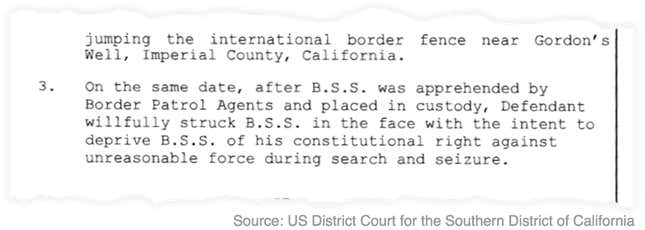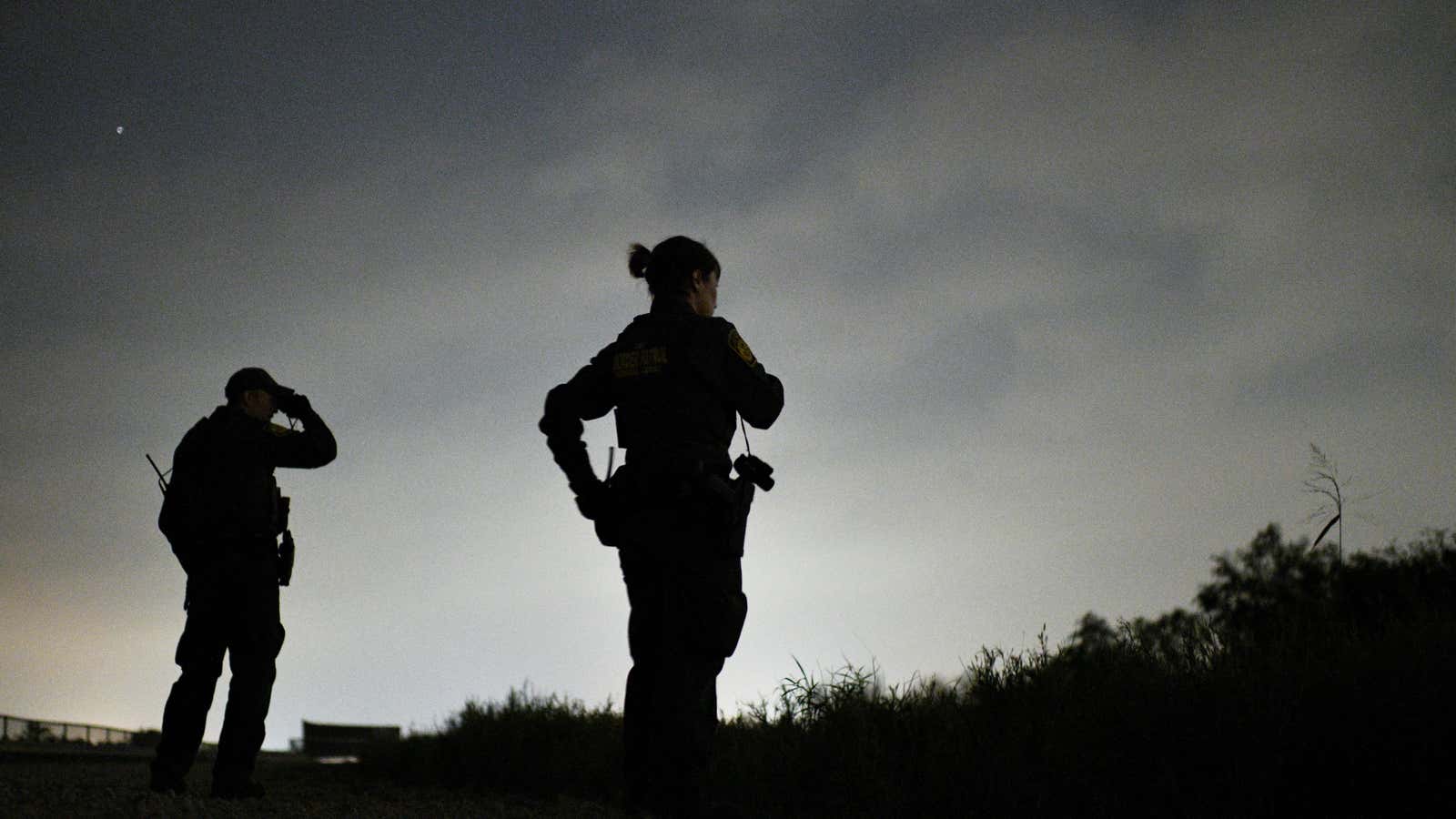A US Border Patrol agent has agreed to resign and surrender his security clearance after being charged by the Department of Justice for physically abusing a migrant in US custody. The agent, identified in court documents as Jason Andrew McGilvray, pleaded guilty to one count of deprivation of rights under color of law.
McGilvray, 49, worked at the Calexico Border Patrol Station in Calexico, California. The case against him stemmed from an incident on Feb. 16, 2019, neither of which have previously been reported.
According to legal filings, which contain scant details, McGilvray was on duty when he encountered “B.S.S.,” an undocumented individual who had jumped the international border fence. After the man was apprehended, prosecutors say McGilvray “struck [him] in the face with the intent to deprive B.S.S. of his constitutional right against unreasonable force during search and seizure.”
Arrests of Border Patrol agents for on-duty wrongdoing are extremely uncommon—only two have been arrested for “mission-related misconduct” since 2016. There is a well-established culture of xenophobia and racism within the agency, but although Border Patrol agents are five times more likely to be arrested than other federal, state, or local law enforcement officers, no Border Patrol agents have been arrested for civil rights violations during that period, according to confidential CBP data previously reviewed by Quartz.
When Border Patrol agents do get into trouble, they are often permitted to plead guilty to lesser charges and avoid jail time or other serious consequences, according to experts and agency insiders.
The charge against McGilvray carries penalties of up to a year in prison, a $100,000 fine, and one year of supervised probation. McGilvray pleaded not guilty on Aug. 22 before changing his plea later that day. He was sentenced to one year of unsupervised probation and ordered to pay a $25 assessment.

Rare accountability
The plea agreement required McGilvray, whose LinkedIn profile says he joined the Border Patrol in 2006, to turn in his badge and pledge to never again “seek or apply for a position as a federal law enforcement officer or agent.” A US government official with knowledge of the matter confirmed that McGilvray quit the force on Aug. 21. The misdemeanor charge will not, however, bar McGilvray from working as a state or local law enforcement officer in the future.
“If anything, I’m encouraged to see that action was taken in this particular instance,” said James Tomsheck, a former head of internal affairs at CBP. “Too many times, during my tenure at CBP, Border Patrol management would take no action in response to allegations of misconduct similar to this.”
A spokesman for US Customs and Border Protection (CBP), Border Patrol’s parent agency, declined to comment on the McGilvray case. Julie Hernandez Ledesma, the Border Patrol union lawyer who defended McGilvray, did not respond to a request for further details.
The handful of other cases in which Border Patrol agents have been prosecuted involved “fairly egregious” circumstances, such as shooting an unarmed person, said César Cuauhtémoc García Hernández, an associate professor of law at the University of Denver who writes regularly about immigration. For McGilvray to have been brought up on charges by a DOJ under the aegis of US president Donald Trump, who has explicitly encouraged Border Patrol agents to violate the law, is in itself notable, Hernández said.
“We are not aware of charges such as these being filed very often,” said Mary Kenney, directing attorney of the nonprofit American Immigration Council. “There are many incidents in which no charges are brought, despite credible reports of wrongdoing by agents.”
(Not) sending a message
About 80% of allegations against Border Patrol agents are for physical abuse or excessive use of force, according to two analyses by the American Immigration Council.
The group also found that only 3% to 4% of all Border Patrol agents accused of abuse face any sort of internal disciplinary action or legal consequences.
The fact that the prosecution of McGilvray took place at all is heartening, said Richard Bolen of the Border Patrol Victims Network, an advocacy group that documents abuses at the border. But it’s not enough, he added, arguing that at a minimum, McGilvray should have faced a felony charge and potential jail time.
“When I saw [McGilvray] got one year of unsupervised probation, that’s barely even a slap on the wrist,” Bolen said. “In my opinion, what they’re doing is really encouraging more of the same type of behavior.”
